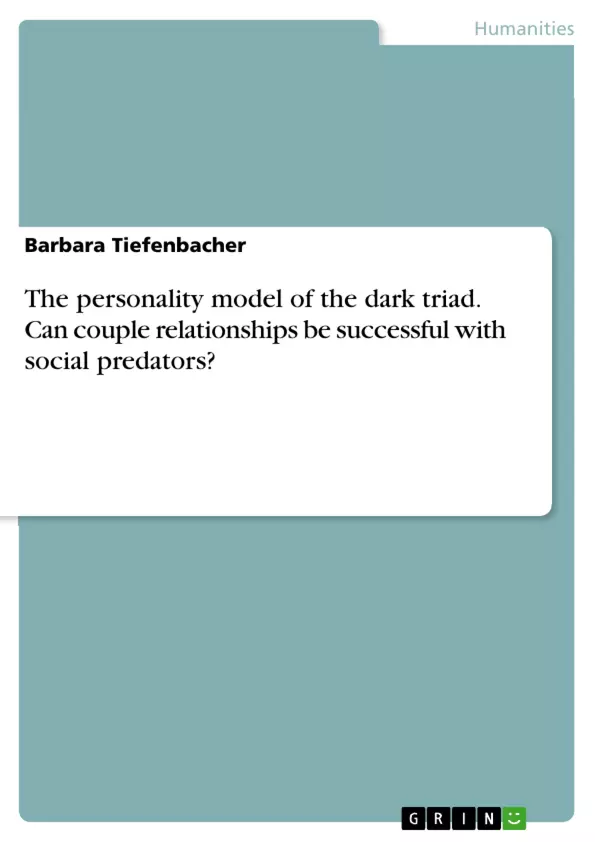Are we humans really completely different? Or are there certain traits that shape a personality? Personality models assume that people can be classified according to a limited set of characteristics.
In 2002, the psychologists Paulhus and Williams developed the so-called dark triad personality concept. These people are therefore characterized by narcissism, Machiavellianism and psychopathy. In her publication, Barbara Tiefenbacher presents these three types and explains which properties characterize each of them.
She is applying the concept to the private sphere for the first time. How are partnerships formed with these social predators? Can they function successfully or in the long term? Tiefenbacher shows which qualities should complement each other in a happy couple relationship.
From the content:
- Love;
- Career;
- Psychology;
- Partnership;
- Dependency
Table of Contents
- Foreword
- Abstract
- 1 Introduction
- 1.1 Problem statement
- 1.2 method
- 2 Definition of the Dark Power of the Triad
- 2.1 Example James Bond
- 2.2 Introduction to the three forms of the dark triad
- 2.3 Gender differences
- 3 Individual fault patterns
- 3.1 Narcissism
- 3.2 Machiavellianism
- 3.3 Psychopathy
- 4 Partnership relations with social predators
- 4.1 Love and the Dark Triad
- 4.2 Short-term relationship
- 4.3 Long-term relationship
- 4.4 The Dark Triad in Correlation with Dependent Personalities
- 5 Conclusion and outlook
- 6 Bibliography
Objectives and Key Themes
This bachelor thesis aims to explore the concept of the Dark Triad personality model, specifically focusing on its impact on interpersonal relationships. The thesis seeks to answer the question: how do partnerships with social predators develop and can they be successful?
- The Dark Triad personality model, encompassing Narcissism, Machiavellianism, and Psychopathy
- The characteristics and motivations of social predators
- The dynamics of relationships involving individuals with Dark Triad traits
- The potential for successful short-term and long-term relationships with social predators
- The correlation between the Dark Triad and dependent personalities
Chapter Summaries
The thesis begins with an introduction outlining the research problem and methodology. Chapter 2 provides a comprehensive definition of the Dark Triad, exploring its three components: narcissism, Machiavellianism, and psychopathy. It also examines gender differences related to these traits.
Chapter 3 delves into individual fault patterns associated with each of the Dark Triad components, providing a detailed analysis of each personality trait. Chapter 4 focuses on partnership relations with social predators, examining the complex interplay of love and the Dark Triad in both short-term and long-term relationships. This chapter also investigates the correlation between the Dark Triad and dependent personalities.
Keywords
The central keywords and focus topics of this thesis include the Dark Triad personality model, narcissism, Machiavellianism, psychopathy, social predators, interpersonal relationships, romantic partnerships, short-term and long-term relationships, dependent personalities, and the implications of these concepts for social and personal well-being.
Frequently Asked Questions
What is the "Dark Triad" in psychology?
The Dark Triad is a personality concept consisting of three socially aversive traits: Narcissism, Machiavellianism, and Psychopathy.
Can relationships with "social predators" be successful?
The thesis explores whether these partnerships can function long-term, noting that they often involve complex dynamics of dependency and manipulation.
What characterizes Narcissism in this model?
Narcissism is characterized by grandiosity, pride, egotism, and a lack of empathy for others.
How does Machiavellianism manifest in partnerships?
It involves the manipulation and exploitation of others, a cynical disregard for morality, and a focus on self-interest and deception.
Is there a correlation with "dependent personalities"?
Yes, the work investigates how individuals with Dark Triad traits often attract or form bonds with people who have dependent personality patterns.
- Quote paper
- Barbara Tiefenbacher (Author), 2019, The personality model of the dark triad. Can couple relationships be successful with social predators?, Munich, GRIN Verlag, https://www.grin.com/document/1181641



